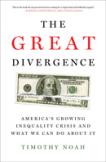Mind the Gap
Economic inequality is the central domestic political issue in the upcoming presidential election, since almost all important policy questions—jobs, health care, declining educational outcomes, the high costs of college, taxation, trade deficits—are merely special cases of how the United States has stopped working for the bottom half, or even the bottom two-thirds, of Americans. Timothy Noah’s Great Divergence, a model of concise, fair-minded exposition, lays out what has gone wrong and what will be necessary to fix it.
For some 30 years, from the early 1950s through most of the 1970s, growth in American incomes was nearly identical over all income quintiles. The rich got plenty richer as the economy boomed, but the poorest improved their position as well, and at about the same rate. Economists opined that this consistent income growth up and down the income ladder was a hallmark of a well-functioning economy.
But something happened about 1977, and the income share of the top earners began to grow much faster than those of people in the lower brackets. The incomes of the top 10 percent rose from a long-standing third or so to just about half by 2007. The share of the top 1 percent more than doubled, from about 9 percent in the postwar years to 24 percent by 2007. And the share of the top ten-thousandth (.01 percent) quintupled. The consequent maldistribution is by far the worst in the developed world. Noah’s accounts of the whys and hows of this groundshift is the most complete and cogent I have seen.
Noah first dismisses some “usual suspects.” Black and Hispanic families are disporportionately in the lower income strata and have been hard hit by the recession, but not more so than poor whites, so it is not about race. Women have mostly improved their economic position, while lower- and middle-class men have lost ground, so it is not about gender either. Immigration has put pressure on low-end wages, but its overall impact is much smaller than most people believe. Noah points intead to a host of small factors, all changing in the same direction, and all reinforced and amplified by a political environment antipathetic to even modest public schemes for redistribution.
Consider the recent apparent shrinkage of middle-class jobs. Computers have replaced armies of corporate clerical workers, just as automated conveyor and picking systems have eliminated legions of warehousemen and inventory clerks. But traditional jobs have always disappeared.
The difference now is that for the first time in history, our educational machinery is not keeping pace with the newer technology. But at the same time, state governments throughout the country are engaged in a radical defunding of public higher education. Those are the institutions that enroll about two-thirds of all American college students.
Globalization, force-fed by new technology, has also had a big impact. Over the last 30 years or so, the workforce available to American companies has expanded at least sixfold, and is much cheaper than the one at home. Offshoring is fraught with management challenges, but it does tend to place a hard cap on production worker pay. Although economists generally deride the idea of trade protection in manufacturing industries, it has been very effective in service fiefs like medicine and law.
Most important, perhaps, has been the last 30 years of conservative politics, which includes the Clinton administration. Inequality did not happen by chance. Bryce Harlow, a longtime adviser to Republican presidents and a founder of the modern business lobbying industry, warned in 1962 that the greatest threat to democracy was that voters would “use the mighty weapon of political equality to enforce economic equality,” putting “the belly...in charge of the head.” Harlow was also a moving spirit behind the creation of conservative think tanks and foundations that have played such a powerful role in recent presidential campaigns.
And there is the new class of what Noah calls “the Stinking Rich,” the mega-billionaires who can finance candidates for presidential nominations all by themselves, and who often exercise great power in critical legislative decisions. The recent period of hyperfinance—when “Wall Street ate the economy,” as Noah puts it—has greatly worsened the problem.
Obviously, there are no simple answers, and Noah does not pretend otherwise. His solutions are a grab-bag, but an intelligent one. Steepen the tax code. Expand domestic government (it offers the best middle-class jobs). Be more receptive to skilled immigrants. Universalize preschool. Slap price controls on higher education. Be tougher on Wall Street. And most important of all, elect Democratic presidents. Historically, economic equality has always increased under Democratic presidents and always decreased under Republicans. Interestingly, Democratic presidencies also ring up higher across-the-board income gains than Republican presidencies, which suggests that Harlow’s notion of a conflict between wealth gains and more equality is simply wrong.
This article also appeared in print, under the headline “Mind the Gap,” in the October 15, 2012, issue.








